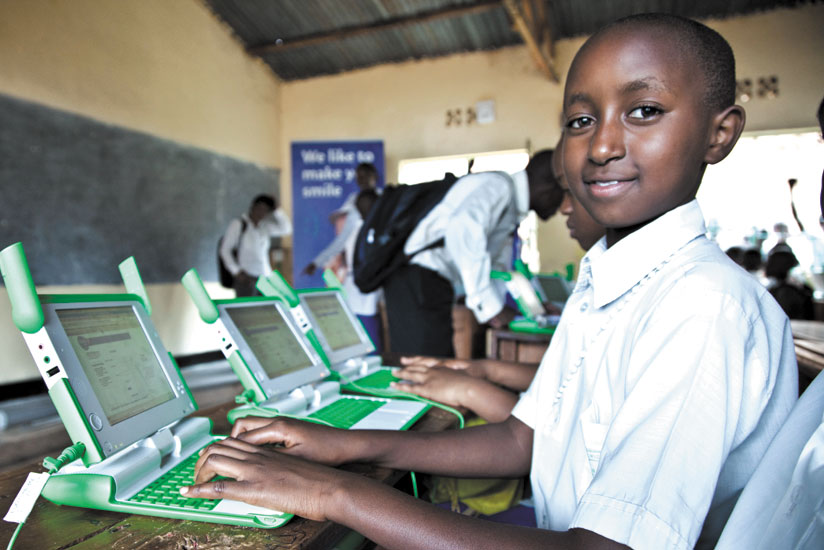With a simple rural oriented desktop application for the teacher, student performance and attendance in schools can now be evaluated and improved. This came after absenteeism and dropout issues in schools became recurrent in top leadership discussions.


With a simple rural oriented desktop application for the teacher, student performance and attendance in schools can now be evaluated and improved. This came after absenteeism and dropout issues in schools became recurrent in top leadership discussions.
"We were convinced that a desktop application for the teacher was the best solution to monitor and report on student status. Our goal is to provide the best study environment for our students in primary and secondary schools,” Oliver Karasira, the founder and CEO of Smart Initiative explains the importance of the app.
Launched in June this year as an ICT penetration solution in the field of education, "Smart Parent” is a tracking and monitoring software that provides daily short text messages (SMS) alerts to parents on the status of their children at school. The tool helps parents and schools to provide the best study environment for children, with a wide ICT penetration capacity in the country.
"We did a market survey and interviewed teachers, school administrations and parents. All of them were very excited to have such a tool being effective, as it was improving the student’s lives,” he says.
The software compiles all course reports and sends an SMS to the parents every day after school hours to keep the parents updated and helps schools to communicate with parents, even for those who cannot access internet.
He says parents will be able to focus on the ability of their children to study well if they receive daily reports on their performance and discipline.
"A child can’t succeed if he is absent or late, he can’t succeed if he is sick, absent minded or sleepy in class, and doesn’t have access to basic hygiene needs. Our main target is to have a smart kid as early as possible as well as have a future generation with values.”
"The teacher will simply use it to update his report after each class, where all his students will be evaluated on 5 indicators; attendance, performance, behavior, health, and hygiene. We provide a laptop in every classroom for the teachers and we train them on the use of the software,” he says.
The project pilot phase will start at Lycée Notre Dame de Citeaux with over 750 students through the last quarter of the 2016 academic year.
The pilot phase is intended to help adjust the software for better use by the teachers and enable them have better interaction with parents.
"Once we are through, we will implement the project from January 2017 in 20 schools per month, providing a solution to over 600 classrooms per month which means 18, 000 students added every month,” Kasasira explains.
"For parents without mobile phones, we link them with different operators in Rwanda so as to use this opportunity. We also encourage them to develop strategies so that they can reach those clients.”
"We can contribute by pointing the names of parents in need of cell phones. To receive the message, there is no need for internet, it’s a rural oriented project,” he says.
Rwanda’s school dropout rate
Statistics from the Ministry of Education indicate that the overall, school dropout rate decreased by more than a half as it went down from 10.5 per cent the previous year countrywide.
"School dropout is still an issue although we constantly have intervention of local leadership. After some research, we didn’t find any ICT oriented solution in Rwanda or abroad. This is how we decided to create our own platform,” Karasira says.
He (Karasira) and his partner Victor Nkindi, came up with the idea to brainstorm about a solution to improve school attendance by simply using a rural oriented desktop application for the teacher.
A vision to make Rwanda a database hub for Africa
Part of Smart Africa’s agenda, is to use ICT oriented solutions in the education system to improve social development and access to ICT. This is why ‘Smart initiative’ was endorsed by African leaders when it was presented to them during the recent African Union Summit in Kigali, a month after it was initiated.
"All institutions in charge of education can have our support and use generated data to take decisions. It is our wish to have a Rwandan product being successful in Rwanda, Africa and all over the world,” Karasira says.
With Rwanda being at the centre stage of its development-with many projects underway to turn the country into an ICT hub in the region, the system provides real time data to be used by government institutions as data measurement for development in the Smart Africa agenda.
"We are using this system in Rwanda and very soon in Africa. We want to cover Africa within 3 years, this is our own vision 2020, if only entrepreneurs in Rwanda would think big, and share our vision with the rest of the world,” Karasira says.
In Europe, the initiative is already present in Greece and the software is already being adapted in the countries. It has also already gained solicitations from across Africa where the solution is being implemented in six countries namely; Zimbabwe, DR Congo, Gabon, Gambia and Uganda where Karasira is currently doing the project pilot phase.
"Once we are able to generate metrics on a district or province’s school evolution through a quarter or a semester, we can identify the need on time but most importantly, the data we generate, will allow Rwanda to become a real database hub in education for the entire Africa,” he says.
editorial@newtimes.co.rw


